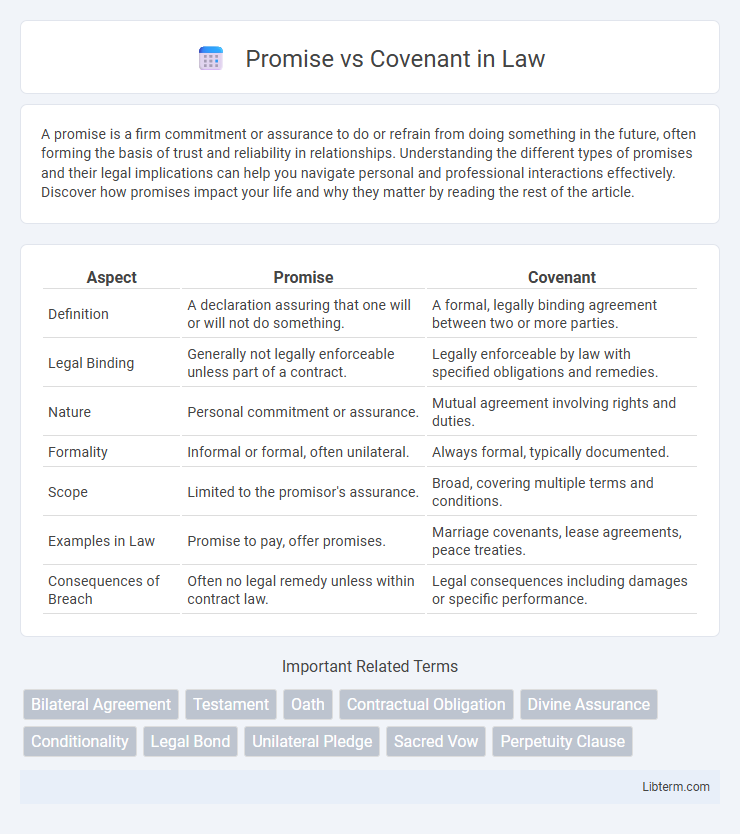A promise is a firm commitment or assurance to do or refrain from doing something in the future, often forming the basis of trust and reliability in relationships. Understanding the different types of promises and their legal implications can help you navigate personal and professional interactions effectively. Discover how promises impact your life and why they matter by reading the rest of the article.
Table of Comparison
| Aspect | Promise | Covenant |
|---|---|---|
| Definition | A declaration assuring that one will or will not do something. | A formal, legally binding agreement between two or more parties. |
| Legal Binding | Generally not legally enforceable unless part of a contract. | Legally enforceable by law with specified obligations and remedies. |
| Nature | Personal commitment or assurance. | Mutual agreement involving rights and duties. |
| Formality | Informal or formal, often unilateral. | Always formal, typically documented. |
| Scope | Limited to the promisor's assurance. | Broad, covering multiple terms and conditions. |
| Examples in Law | Promise to pay, offer promises. | Marriage covenants, lease agreements, peace treaties. |
| Consequences of Breach | Often no legal remedy unless within contract law. | Legal consequences including damages or specific performance. |
Understanding the Concepts: Promise vs Covenant
Promises are individual commitments based on trust, often verbal or informal, reflecting personal intentions or assurances. Covenants represent formal, binding agreements involving mutual obligations and are typically established through legal, religious, or solemn protocols. Understanding these distinctions highlights promises as personal guarantees, while covenants function as structured, enforceable pacts between parties.
Historical Origins of Promises and Covenants
Promises and covenants originated in ancient legal and religious traditions, where promises were personal commitments made between individuals, and covenants were solemn agreements often established between groups or between humans and deities. In Mesopotamian and Hebrew cultures, covenants held a sacred status, outlining mutual obligations and blessings, such as the Mosaic Covenant in the Hebrew Bible, which formed a foundational religious and social contract. Historically, the distinction between a promise and a covenant was marked by the formal, binding nature of covenants, which were typically ratified with rituals symbolizing enduring commitment.
Key Differences Between Promises and Covenants
Promises involve a personal commitment made by one party to another without formal obligations, whereas covenants are legally binding agreements involving mutual commitments and formal terms. Promises often rely on trust and moral obligation, while covenants carry enforceable obligations with defined consequences for breach. Key differences include the level of formality, mutual responsibilities, and legal enforceability inherent to covenants compared to the generally unilateral nature of promises.
Legal Implications: Promise vs Covenant
A promise imposes a binding legal obligation typically enforceable when one party voluntarily commits to a specific action or forbearance, often contingent on consideration. A covenant, however, represents a solemn, legally binding agreement that creates enforceable duties or restrictions, frequently found in contracts, property law, and statutory obligations. The legal implications differ as covenants often involve enforceable equitable remedies like injunctions, while breach of a promise primarily results in damages or specific performance depending on jurisdiction.
Religious Perspectives on Promises and Covenants
In religious contexts, promises often denote individual commitments made before God, emphasizing personal faith and obedience, while covenants represent solemn, binding agreements between God and His people, reflecting mutual obligations and divine blessings. Biblical covenants, such as the Abrahamic and Mosaic covenants, establish foundational theological frameworks that define collective identity and divine law for communities. These sacred covenants carry enduring spiritual significance, distinguishing them from ordinary promises through their formal rituals and covenantal signs like circumcision and the Sabbath.
Social and Cultural Significance
Promises serve as personal commitments that build trust within social relationships, reinforcing individual accountability and social cohesion. Covenants hold deeper cultural and historical significance, often symbolizing sacred agreements that define communal identity, religious beliefs, and societal norms. Both concepts shape social structures, but covenants carry formal weight that guides collective behavior and preserves cultural heritage across generations.
Examples of Promises in Everyday Life
Promises in everyday life include commitments like agreeing to meet a friend for coffee, pledging to complete a work project by a deadline, or assuring a child that they will be taken to the park. These examples highlight personal assurances that create trust and expectation without the formal, binding nature of covenants. Unlike covenants, which often involve mutual obligations and legal or solemn conditions, promises generally reflect voluntary intentions subject to fulfillment based on personal honor.
Real-life Covenants: From Marriage to Contracts
Real-life covenants are legally or socially binding agreements that create mutual obligations, such as marriage vows or business contracts, which establish enforceable commitments beyond simple promises. Unlike casual promises, covenants involve formalized terms and conditions that often require witnesses or legal documentation to ensure accountability. This distinction underscores how covenants serve as foundational tools in personal relationships and commercial transactions to secure trust and cooperation.
Breaking a Promise vs Violating a Covenant
Breaking a promise generally entails failing to fulfill a personal or informal commitment, often causing disappointment or loss of trust but without legal consequences. Violating a covenant involves breaching a formal, binding agreement that carries legal or religious significance, frequently resulting in penalties or dissolution of obligations. The severity and implications of violating a covenant surpass those of breaking a promise due to its enforceable and often collective nature.
Choosing Between a Promise and a Covenant: What Matters Most?
Choosing between a promise and a covenant hinges on the level of commitment and legal implications involved. A promise represents a personal assurance without binding legal force, while a covenant entails a formal, often legally enforceable agreement with mutual obligations. Understanding the context, consequences, and parties' expectations is crucial in determining whether a promise or a covenant best serves the intended purpose.
Promise Infographic

 libterm.com
libterm.com